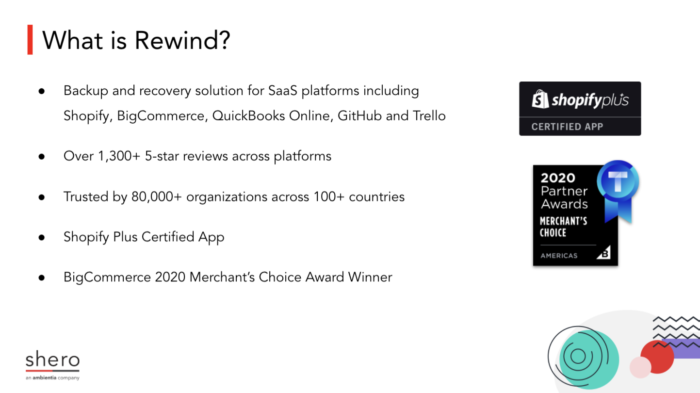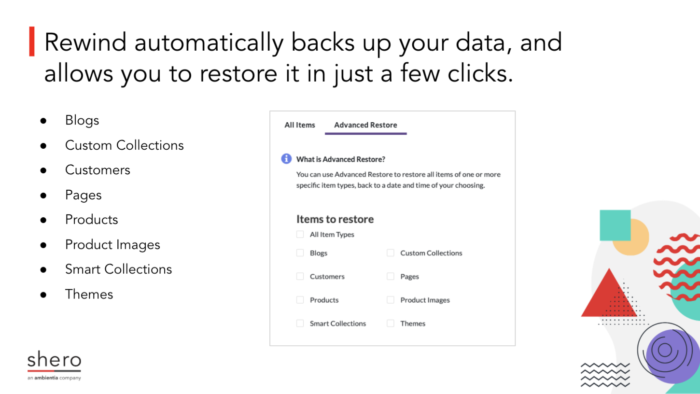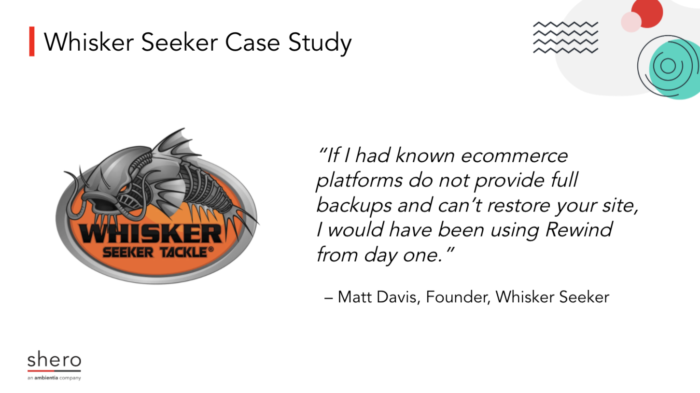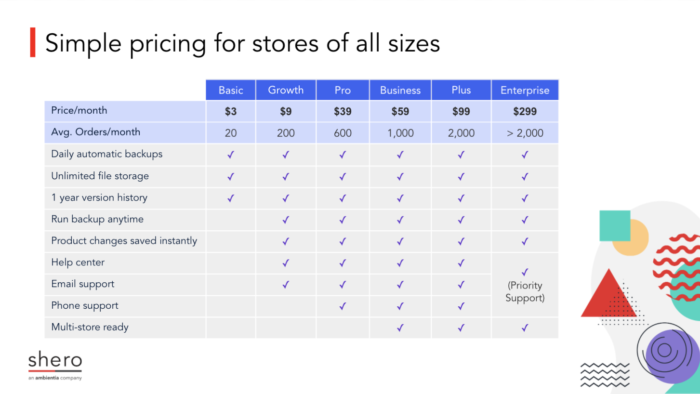How important is it to backup your data when it comes to your eCommerce store?
The experts say it’s critical. Sure, you want to protect your investment of time and money. But keep in mind, most platforms don’t guarantee that they can retrieve your lost data if an unexpected event occurs.
What is a data backup?
Let’s take a step back. By backing up your data, we don’t mean just saving your product descriptions in case you need to reference them.
We’re talking about a full, constantly updated archive of your online store’s data. That way, you can restore your site as-is in case your data is ever lost or corrupted.
The need for a backup stems from a variety of concerns. These are typically beyond our control, including computer viruses, errors in coding, theft, hack, and more.
Why Should You Back Up Your Online Store’s Data?
This is such an important, yet, often-overlooked aspect of running an eCommerce store. That’s why we felt it was necessary to call in the experts to explain just why data backups are so important.
In the video below, we interview Farrah Boehm, the partner marketing manager at Rewind, a platform that enables companies to back up, restore, and copy the critical data that drives their business.
More than 80,000 businesses have trusted Rewind to protect their online stores. This includes eCommerce brands like Endy, MVMT watches, Fashion Nova, Knix, and Gymshark.
We’ll share Rewind’s Seven Critical Reasons to Backup Your eCommerce Store Today.
Reasons to backup your data include:
- Human error is more common than you’d think
- Bulk imports may be flawed
- Coding errors can affect your store’s theme
- Not all third-party apps are reliable
- Malicious attacks can come from internal or external sources
- Not all freelancers can be vetted
- Hackers are targeting more SMBs than before
Watch the video, or read the transcript below to learn why and how to backup your data.

We’ve noticed that many merchants are turning to SaaS platforms like Shopify and BigCommerce. Why is it important for SaaS stores to have a backup in place?
This is true, we’ve definitely seen a growth in SaaS, as well.
There’s a common misconception about what SaaS platforms in general provide when it comes to backups.
Taking Shopify and BigCommerce as examples—they perform platform-level backups to protect themselves against natural disasters, data breaches, and other threats.
In the very unlikely event that something extreme occurred and their whole system failed—for example, if a meteorite struck their data center, or there was a mass data-breach—Shopify or BigCommerce would be able to restore the data of everyone on their platform.
However, if something happened to your store in particular, that backup is not useful to you. You do not have access to it.
So if a third party app causes a problem or a CSV import goes wrong, or if someone accidentally (or maliciously) deletes products from your store, you can’t call Shopify or BigCommerce and have them recover your lost data, even for a fee.
Shopify makes it clear in their Terms of Service that merchants are responsible for protecting their own store data.
This comes as a surprise to most people, not just for eCommerce merchants, but really across SaaS in general.
From product images and descriptions, to customer info and order history, merchants create a lot of valuable data at the individual store level. And they rely on that data to populate their store, display their products and generally provide an excellent shopping experience to their customers.
This data is their responsibility to backup and protect.
Platforms like Shopify and BigCommerce don’t come with an undo button. That’s where backups-as-a-service comes in to fill that gap.
We’ve all heard horror stories about companies suddenly losing all their data and hard work. Can you give an example of a client whose hard work was saved because they had a backup in place?
Yes; the horror stories are awful, and we hear a lot of them.
Many merchants who work with us install Rewind after having lost products, orders, collections, themes, or other kinds of store information, to prevent that from happening to them again in the future.
Fortunately, we also do get to hear positive stories from Rewind clients who were able to breathe a sigh of relief after being able to rapidly restore their lost data with just a few clicks.
When the worst happens, the person who thought ahead suddenly becomes the office hero.
As an example, one of our customers lost more than 3,000 products—and more than a year’s worth of work—after a developer he worked with maliciously deleted the data. The only thing that saved him was his backups.
That’s certainly an unexpected reason, and probably a good way to jump into your top-seven list. What are some of the most urgent reasons to backup your online store’s data?
1. You’re human.
Human-error is the single biggest cause for data loss. No matter how much training we do, or how many times we’ve done the same thing, mistakes happen.
You might be trying to delete a blog category and end up accidentally deleting all of the blog posts in that category. If have a backup, you can continue building your online store fearlessly, knowing that you can undo a mistake.
2. You import CSV files
CSV imports can be helpful when making bulk edits to a store. But they can actually do more harm than good if even one column isn’t accurate.
When you backup your data, you can feel confident importing CSV files because if there is a mistake, you can go back in time to before the import and try again.
3. You edit or modify your theme code
The easiest way to break a website is by making a small mistake in its code.
If you’re making any customizations or edits to your theme code, you need to have an easy way to reverse changes that didn’t work out the way you expected.
Without a backup, reversing changes might mean spending hours redoing work or even hiring someone to help you clean up the mess.
4. You install third party apps
Shopify merchants have an average of six apps installed.
When the apps work, they’re wonderful! But when they don’t, they can cause serious problems.
If you look closely, the majority of third-party integrations require “read and write” permissions, meaning they can also change, manipulate, or delete your data if connected improperly.
Any time you are integrating a new app in your store, you should be aware of the permissions you are granting the app and have a backup in case the app makes any unwanted changes.
Apps required for all shopify and bigcommerce stores, but not all apps created equal.
5. You may have a disgruntled employee
No entrepreneur wants to think about the possibility that their own employees could do something maliciously to hurt their business, but like I mentioned earlier, unfortunately, it does happen.
Employees often have access to your online store and thus the ability to delete important files if they feel motivated to do so. If this happens, when you backup your data you can easily restore will save you from suffering the consequences.
6. You hire freelancers to work on your store
Similarly to employees, when you hire a freelancer or contractor to work on your store, you are giving them permission to edit your store.
It’s not always easy to vet freelancers and find someone you can trust, especially from websites like Fiverr.
7. And last, You’re worried about hackers
Historically, cybercriminals target large organizations—but that has changed.
A 2020 Verizon study found that almost one-third of cybercrime victims were SMBs.
While Shopify takes extensive precautions to protect their servers against any malicious attacks, hackers target individual accounts and get increasingly creative with their methods.
Having a backup is recommended to protect your store from the damage that hackers can cause.
Given how important it is, what do you think are the best ways to ensure that your eCommerce store has a proper backup?
You could build it into your daily process to manually backup your store, updating all associated files -but this approach is highly time consuming.
And, if something goes wrong, repopulating a store can take days, sometimes weeks.
Instead, a complete data backup and restore solution ensures that your critical data is always accessible. Should anything go wrong, your data can be restored with a few clicks, minimizing or completely eliminating store downtime.
Since Rewind offers this complete data backup service, tell us more about the company.
Since 2015, Rewind has been on a mission to help businesses protect their cloud data.

Today, more than 80,000 customers in more than 100 countries use Rewind’s top-reviewed apps and support to ensure their SaaS applications run uninterrupted.
Rewind makes it easy to backup, restore, and copy the critical information stored in a growing list of SaaS applications, including Shopify, BigCommerce, Quickbooks Online, GitHub, and Trello.
Plus, we’re the only Shopify Plus certified backup app and a BigCommerce 2020 Merchant’s Choice Award Winner.

The value that Rewind provides isn’t just that we back everything up, the value is the speed in which we can help you recover. Rewind allows you to minimize or completely avoid the costs associated with store downtime.
You can trust that the critical data that drives your business is securely backed up and available for you to easily recover if something goes wrong. You’re in control of your data, allowing you to restore anything from a single image to your entire store.
Here are a couple of examples of stores who’ve turned to Rewind for backup services.

Before they became a Rewind customer, Whisker Seeker—the largest manufacturer of catfishing equipment in the US—added a bulk import of changes through a CSV that resulted in accidentally wiping their entire product catalog, which contained over 300 SKUs.
Every product, every SKU and every photo was permanently deleted. The worst part was this happened just three days before Black Friday.
They faced $120,000 USD in potential losses if their site was not restored.
The founder, Matt Davis told us that he felt like he was literally going to have a heart attack. They now use Rewind and haven’t had an issue since.
Then there’s fitness brand Crossrope.
Before becoming a Rewind customer, Crossrope made an update to their theme code that broke the ability for customers to add products to their cart, which essentially halted all sales.
They had to turn to their last manual (theme) backup, which was a month old. Restoring this backup caused its own set of problems as any theme updates over the last month were lost.
The entire process of restoring the site back to normal took 24 hours of work and resulted in lost sales opportunities. Now, they use Rewind.

No store is too big or too small; our pricing plans are based on the store’s order volume.
All of our plans start with a seven-day free trial to allow you to get comfortable with the product.
You can install Rewind on the Shopify or BigCommerce app store, it’s easy to set up and connect with your account.
That’s great. If viewers want to find out more about Rewind, where is the best place for them to go?
A great place to start is rewind.com.

Learn more by checking out Rewind’s listing on the Shopify or BigCommerce App Store. We’re also active on LinkedIn, Twitter, Facebook, Instagram and YouTube, so we would encourage you to follow us for our latest updates and useful tips.
Contact us today to take your online store to the next level, through:
- Increased conversions
- Better SEO
- Enhanced customer experience
and more, or to replatform your existing store to a newer, better version of itself.
Gentian, CSO and co-founder of Shero Commerce, guides the company and client digital strategies. He's an expert in technical SEO, Inbound Marketing, and eCommerce strategy.


